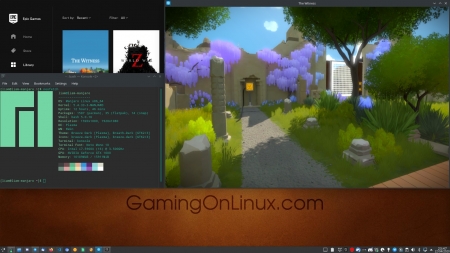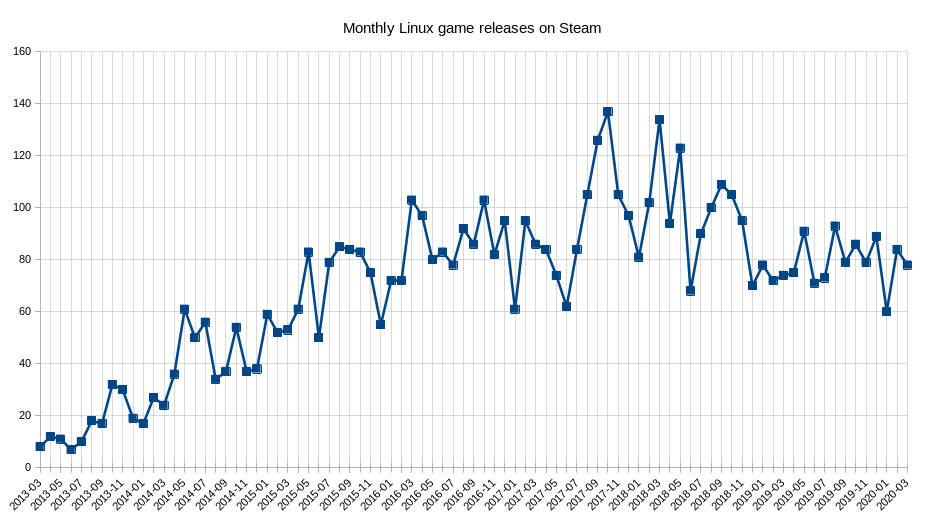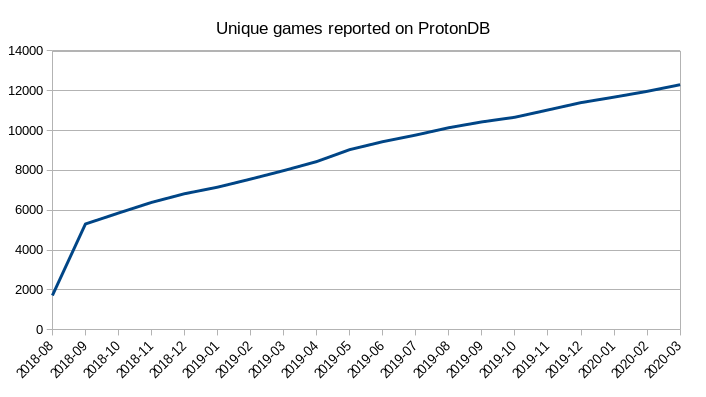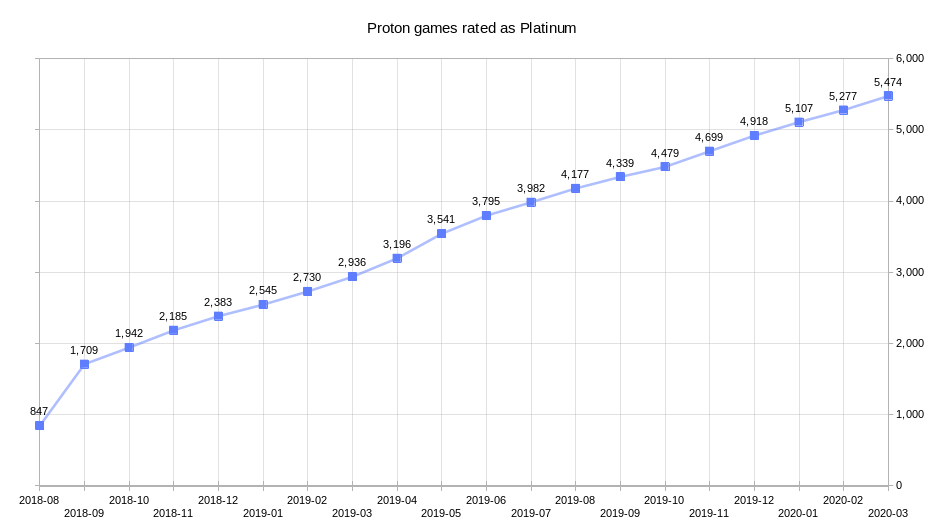Seven years ago, Valve officially released the Steam client for the Linux desktop and since then the amount of games playable on Linux has continued rising. Thanks to Steam Play Proton, that's grown drastically too. Here's a brief look at how Linux gaming is doing right now.
Looking over Steam stats there's now well over 6,000 games that support Linux with a build. Taking into account games being listed that have not yet released, it's actually around 6,366. Three years ago it had only just hit over 3,000 so it's more than doubled during that time.
Here's a little look at how that number of Linux games releasing monthly on Steam has changed:
It's worth noting that between 2013 and 2018, the total amount of games being released on Steam jumped thousands a year. However, the difference between 2018 and 2019 was quite small. Steam as a whole appears to be calming down drastically on increased yearly releases.
With Steam Machines being announced back in September 2013, you can see a clear upwards trend going on afterwards. To me now, this data tells us we're finally seeing the tail-end of the original hype as Valve steered away from Steam Machines (although SteamOS may yet live again) and it looks like we're actually stabilising to monthly releases around the 80 mark.
It is just a number though of course, quality is obviously the most important but it's still impressive considering how Linux gaming is currently still very much a niche. We do have some of the most consistently popular Steam games available on Linux including: Counter-Strike: Global Offensive, Dota 2, Terraria, Total War: WARHAMMER II, PAYDAY 2, Stardew Valley, Cities: Skylines and the list goes on. Lots of Linux games constantly being the most played on Steam.
As of March 2020, Linux sits at 0.87% of the total market share on Steam from Valve's monthly opt-in user survey. This puts the amount of "monthly active" Linux players on Steam around 826,500 (see our Steam Tracker for more).
To help with that number, nearly two years ago Valve announced and released Steam Play with Proton (see our Steam Play page for more). A compatibility layer based on Wine (with other bits included) to get Windows games running on Linux. This means anyone switching to Linux, can hopefully play the majority of their games. Some are flawless, some don't work at all and there's all sorts in between. When it works and works well (example), it can be pretty amazing.
How's Proton doing nearly two years on? Using data crowdsourced from users on ProtonDB it's proving popular.
That tells one story, how about how many Windows games are actually playable on Linux when using Proton? Let's take a look at that too. Only using what games should be click and play ("Platinum"):
There's likely a lot more that are playable, as ProtonDB depends on user reporting. As impressive as it is, there's still a very long way for Proton go still. For multiplayer titles anti-cheat is still a sore spot. You won't (usually) be able to play games that have Easy Anti-Cheat or BattlEye (they both have Linux builds but they don't work with Proton). We did get confirmation of Easy Anti-Cheat attempts being made before, same with BattlEye but since then not much in public has been said about it.
All of this is only looking at Steam too.
There's still a lot of games that aren't available on Steam at all. Over on GOG.com, even they have close to a thousand games available for Linux. You also have big hitters like Overwatch (which works great), Starcraft II, the Battlefield series and more from certain publishers with their own store launchers. A lot of them can also be played on Linux with Wine, and using Lutris makes them easy to setup too.
Is that an elephant in the room I see? Yes. The Epic Games Store, that's another that doesn't support Linux and it appears Epic Games have no current plans to do so either. Tim Sweeney did mention before he thinks Wine can help break the cycle, and that's certainly what Valve seem to be trying to do. Wine again can help there though, since the Epic Games Store can be run through it.

Pictured: Epic Games Store on Linux
Right now, Linux gaming has been Steamrolled forwards thanks to many different companies and people—mostly Valve (and their many contractors and partners). There's a lot of others doing awesome work though, don't think I will forget that ever. Various Linux game porters, people working on cross-platform game engines and other software that supports Linux - every single bit helps.
It's pretty incredible how far it's come! If you just want to click and play, making a /home on Linux has never been better.
I am still amazed at the success of Linux gaming, considering our relatively small market share. I do hope that Valve (and everyone else) continues with the great support.
I still prefer native games, but have been astounded at the progress of Proton.
Last edited by no_information_here on 23 Apr 2020 at 6:26 am UTC
Another issue that might though never be solved, are games using Valve's own DRM: CEG (Custom Executable Generation). This doesn't work on Linux at all. I was able to get only one single game running with it, and that's a bit of a hassle: Aliens. vs Predator from 2010. You need to get the Windows binary on that very machine, be it downloaded on Windows directly or via the Windows Steam client and wine. Then you can replace that executable (both DX9 and DX11 versions), but also need to fake the date. But then it works, incl. multiplayer.
Unfortunately Plagman (Pierre-Loup Griffais) himself said, that CEG might never work:
- [Comment 616679472](https://github.com/ValveSoftware/Proton/issues/753#issuecomment-616679472)
- [Comment 616688745](https://github.com/ValveSoftware/Proton/issues/753#issuecomment-616688745)
Well, those CEG protected games mostly work flawless with Wine directly (A:CM, AvP, Duke Nukem Forever, etc.), so Lutris is the easy way to get those games up and running.
Also I guess getting EAC and Battle Eye working are much bigger fish to fry ^_^ Especially as I've seen, that Dying Light: Bad Blood (available for free to Dying Light owners) just works perfect, but as soon as you try to play any kind of multiplayer (even just private matches), EAC kicks you out.
Nevertheless, there are now way more games playable on Linux than you have time to play. But you can try
Last edited by Corben on 23 Apr 2020 at 6:44 am UTC
Sure, not ALL games work yet on Linux. I haven't been able to play For Honor, Street Fighter V or the new MK11 (notice a trend? Fighting games tend to do poorly on Linux. SFIV and MKX work flawlessly though, so it's only a matter of time before the new ones are playable), but with the fact there's tons of other games to play anyway, the individual incompatibilities really stop being an issue. Game doesn't work on Linux, natively or with Proton? Guess I won't buy that game, then. It's really not my loss in the end.
Microsoft itself really isn't an OS company anymore, nowadays they are mostly a cloud provider. Guess what OS runs in the cloud? There we have the source of the 'we love Linux' policy they've been having lately. Windows really became a liability to Microsoft's own operations, which is a bit comical.
My point is that in the coming years, I think we can expect Linux to grow significantly; there are several trends going on right now that push people to improve the Linux state of things every day.
The big test coming up is Cyberpunk 2077. I really wonder if that one will be playable on launch or close to launch date. If it is, Linux is truly a viable gaming OS.
if it were, valve would already use it as reference.
people who vote on it, never played those games in other platforms to know if there are missing features.
i already quoted a few examples, guilty gear were missing cutscenes (op, extras, every video on the game and maybe some musics and sound effects), the only reason i know that is because i already played other games from this company and guesses something was missing since other games had an intro, then played it on windows/saw an gameplay on youtube and confirmed the missing feature.
i wonder what happens with games that use video as texture (ex: for fire), if people do realize that something is wrong and report it...
i wish i could try more games, but i'm broke, trying to make money with open source was not an good idea, now i dont have money for an new computer capable of running more games, nor to the games thenselves and with this global pandemic i will not have money so soon...
It will probably still support D3D11I wouldn't count on that. And even if it does, it remains to be seen if D3D11 can deliver any sort of playable performance (when purely looking at CPU performance, Witcher 3 actually has an extremely efficient renderer, but there are already games that require D3D12 for decent frame rates, e.g. Shadow of the Tomb Raider, Monster Hunter World).
The game is known to support D3D12 with optional raytracing, so that's probably going to be their primary target and quite possibly the only API they are going to support. That said, the game comes out in five months, plenty of time to get vkd3d into shape.
Last edited by YoRHa-2B on 23 Apr 2020 at 4:05 pm UTC
I am willing to bet Cyberpunk 2077 will be Platinum day 0, or at least pretty soon after day 0. The main reason is that it won't be using any DRM (this is huge for compatibility) from GOG, or a minor Steam DRM at worst. It will probably still support D3D11 and DXVK will probably make short work of that game, given that Witcher 3 is one of the most compatible games around and even though i heard they changed the engine for CP2077 it won't be much different i think.
Yep, the chances are good. It's a Stadia game. Also I was under the impression their engine uses Vulkan. We'll have to see, but hopes are high that Wine will have no problems.
I know some people who will have to pickup their own jaws from the floor once I tell them I'm playing CP2k77 on my Linux desktop
ep, the chances are good. It's a Stadia game. Also I was under the impression their engine uses Vulkan
If they're deploying on Stadia then they have to use Vulkan, so basically yeah.
The game is known to support D3D12 with optional raytracing
Do you have a source for that? I've never seen developers of CP2077 explaining what graphics API they are using. I asked them many times, they never explained. The only indirect information was their announcement of Stadia support which naturally implies Vulkan.
Ray tracing announcement alone doesn't explain things, since Nvidia supported it with Vulkan same as with DX12 from the start, and now there is a standard Vulkan extension for it as well. So using ray tracing plans announcement doesn't say anything about DX12 really.
Last edited by Shmerl on 23 Apr 2020 at 7:52 pm UTC
Looks like monthly releases have more or less levelled off. I'm curious as to what the linux monthly releases look like in comparison to to all monthly releases, but I'd assume that the latter is continuing to grow, which would mean that the percentage of games releasing that support linux is actually decreasing. :'(The issue is interesting.
As looking at total releases on Steam for Windows, between 2018 and 2019 the later year only just had more releases the difference was very small overall. When looking at SteamSpy that is, my own scraping calculation actually showed less releases overall in 2019 than 2018. Either way, each year until 2018-2019 the difference was multiple thousands, now it is far far less.
Averaging total 2020 releases so far, it's not going to be much more than 2019 if the trend keeps up. So it's not a black and white issue of Linux decreasing by itself - total releases on Steam seem to be around a point where the dramatic yearly increases are no longer happening. You could say, Steam itself has gotten to a point where it's close to stagnating in terms of yearly releases growth.
Last edited by Liam Dawe on 25 Apr 2020 at 1:22 pm UTC














 How to set, change and reset your SteamOS / Steam Deck desktop sudo password
How to set, change and reset your SteamOS / Steam Deck desktop sudo password How to set up Decky Loader on Steam Deck / SteamOS for easy plugins
How to set up Decky Loader on Steam Deck / SteamOS for easy plugins
See more from me